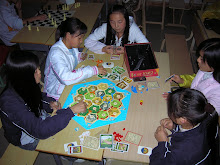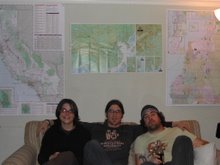At about 5:00 in the afternoon I began to have stomach pains. I had just begun Oral English interviews with students. By 7:00 p.m. the pains had become markedly worse. I conducted all of the interviews just outside Bethany’s apartment because it was a sunny day. I went inside and drank some water.
By 8:30 p.m. I had thrown up in Bethany’s bathroom, and I was trying to remain motionless on the bed as my stomach continued to get worse. At around 10:30 p.m. I could no longer handle the pain and, in a plaintive voice, asked Bethany to call the Peace Corps Medical Officer (PCMO) in Chengdu. The details of these phone calls are very hazy. Actually, from 10 p.m. Wednesday until 6 a.m. Thursday I can remember specific events, but their order and what happened during the gaps I cannot recall exactly. I remember the pain that would not go away and instead got worse and worse.
Through a series of phone calls between the foreign affairs representative, the deans of the English Department, my counterpart, and the medical staff in Chengdu, a car was arranged to take me to the hospital. I remember a fog of incidents that were designed to discover what was wrong with me: drawing my blood (my white blood cell (leukocyte) count was around 12,000), taking an x-ray (there seemed to be a bright white spot on the photo that alerted the doctor), a series of stomach probes to determine if there was a problem with my appendix, an ultrasound, and, finally, an intravenous drip feed which included several different medications.
Throughout this time I was almost completely non-communicative. Walking through the halls I would moan because the pain was so excruciating. The two deans from the English Department had met us at the hospital and they stayed with me until around 3 a.m. The foreign affairs representative, the deans, and even the driver helped to support me as I walked from ward to ward for different tests. At one point I had to get in the car to be transported to a different ward in the same hospital (the campus included several different buildings) and another time I was taken to a different building to go to the bathroom. The pain had taken away all of my inhibitions and dignity. I was pathetic.
Of my surroundings I remember the green tiles on the walls the best. The long, old hallways brought back feelings from my childhood, but I cannot remember exactly why the hospital seemed so familiar. The bed sheets were dirty and they asked for new sheets before I started my IV. I had to go to the bathroom again at some point, and the foreign affairs representative helped me by carrying my IV down the hall and into the bathroom (the IV stands were made of wood and had no wheels). When I got back to my bed, the blood from my arm had filled the bottom part of the IV system and wouldn’t go back into my arm. The nurse seemed upset and she disconnected the plastic in the center of the IV, sprayed my extra blood on the floor beneath my bed, and reconnected the IV. It started to work again.
By the time I woke up the next morning I had slept for around 2 hours, but the pain had decreased significantly. After taking blood again and determining that my leukocyte count was still too high (10,000), the doctor recommended that I stay in the hospital for more treatment. The PCMO agreed and I spent the day watching bottle after bottle replaced during my second round of treatment. After going to the bathroom on one occasion, my hand started to develop a bump where fluid was gathering and the IV had stopped. The nurse put a new IV in my other hand and it continued: glucose, some kind of sodium chloride solution, and several different medications. That night they took more blood, but my leukocyte count remained high. I was told to stay another night.
The next morning, after more phone calls between the PCMO and the attending doctor at the hospital, I was told that I might be able to go home. A fourth blood test was done and it came back with a leukocyte count of around 5,000. I left the hospital and went home.
What was wrong with me? This question is difficult to answer specifically, though a general answer to the question is that food led to this problem. Earlier in the day, I made fried Chinese cabbage and rice. I probably used too much oil, and the cabbage led to a buildup of gas in my intestines. The question of whether there was a blockage or not was never answered.
Throughout this ordeal I was taken care of by people from the college. My site-mate, Bethany, accompanied me to the hospital, the foreign affairs representative arranged for the car to take me to the hospital and, when I arrived, the deans were waiting to help in any way they could (and it was around 12:30 or 1:00 a.m.). The next morning students began to arrive with bananas and their class textbooks. My counterpart brought me a large bouquet of flowers and a stuffed-animal goat with a scarf. My counterpart stayed with me for the entire day, contacting the PCMO when needed, talking with the doctor, and making sure I had anything and everything I needed to be comfortable. Students came and went, although one of my freshmen students spent the night in the hospital.
All of the bills (excepting the first registration fee) were covered by the school. Peace Corps will reimburse them later, but it is a requirement to pay for things as they are provided. The x-ray, ultrasound, blood tests, doctor fees, room fee, etc. were paid for, essentially, as they were provided. China’s health care system changed from one of almost universal access to that of “show the money and we’ll help you out.”
The experience was very unpleasant. The conditions were generally satisfactory, although I think they could have been much better. Trying to navigate the squat toilet with an IV in one hand and the bottle in the other is something I don’t want to do again any time soon. The first morning a woman came into the hall where I was sleeping, pulled out a bedpan, and made use of it. The smell of the bathroom wafted into the room where I stayed the second day and night, and people kept coming and going.
There were two other beds in my room, though I think there was only one other patient. He was an older man. I don’t know why he was in the hospital, but he had a type of catheter in his belly and he had a terrible cough during the night. Through this experience I saw how culture affected hospital stays in China. The family stayed with the old man around the clock. There were 3 people who were almost always with him, and when any of them left other family members or friends would arrive to talk with him or help out in some way. They brought their food from home and cooked it in the hospital. They helped him wash and they changed his IV.
The leader of our department could not teach during the last year because he has cancer. He was in a different ward and during a walk my counterpart invited me to go with her to visit him. I remember meeting him at the banquet when I first arrived at the school. He was a very thoughtful person who spoke in smooth, deliberate sentences. He was the biggest teacher in the English department as well.
His room had 8 beds. His wife was busy cooking dinner when we arrived. He recognized me and we spoke for a few minutes about basic things (why I was in the hospital, how my semester was, etc.). I noticed that he was markedly thinner. He was wrapped in a blanket, though the room was somewhat warm. After visiting him, my counterpart said that he was very happy to see me (they had spoken some Chinese that I didn’t understand). I felt very sad, though I hardly know the man.
In my spare time I studied Chinese and slept. My students kept me company by talking with me or teaching me card games. I explored, in some sense, a piece of Chinese collectivism at work. Students left their classes or skipped them to come and see me. I expect that certain students were expected to come and see me to fulfill a duty. I don’t say this to diminish the courtesy of their visits, but to show how the Chinese classroom works. Besides, I may be wrong about the students being expected to come.
Each class has a monitor who is in charge of the affairs of the class. They are the overall leader of the class and most seem to take their jobs very seriously. As I found out one day, there are other types of jobs as well: cleaning monitor, teaching materials monitor, etc. (perhaps there are 10 different jobs). It generally falls upon the leader to communicate with others or represent the class when things happen (if a student is ill, etc.).
When I got back to the school I met several students along the road to my apartment. They asked how I was doing. I met a student who had already visited me in the hospital and she said, “Oh! The other class is going to see you right now. There are 20 students.” She called one of the students and told them that I had left of the hospital. So they went shopping instead. That’s another aspect of Chinese culture: the ability to roll with the situation. Generally there is a more fatalistic bent to their thinking.
I bought some gruel at the store next to the school gate. I climbed the stairs to my apartment, opened the door, sat on my couch, and ate for the first time in 45 hours, happy to be home again.
6.27.2008
Subscribe to:
Post Comments (Atom)








1 comment:
honestly, the best part of this intense story is: "After it was all over, I went to the store and bought some gruel..."
like Oliver Twist or something...
AWESOME blog! hope all is well....
Post a Comment